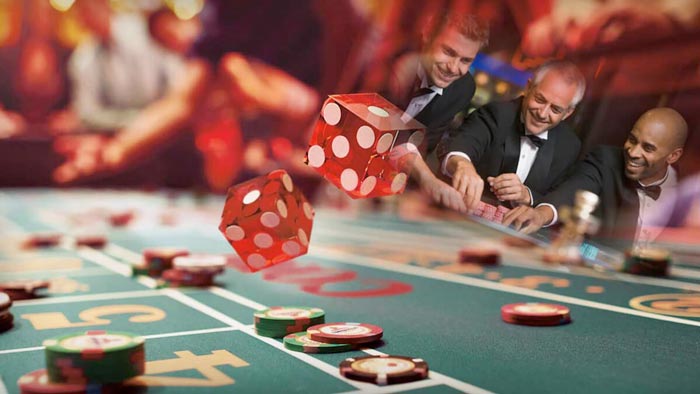Gambling happens when you play any game of chance or skill, in which you stake something valuable that has potential for a prize win..
Often, people who gamble risk money in hopes of winning a greater sum of money. For example, you might risk the cost of a lottery ticket for the chance at winning a large multimillion-dollar jackpot.
When we think about gambling, often places like casinos or racetracks come to mind, but gambling occurs in other places too, like gas stations, church halls, at sporting events and on the Internet.
Common forms of gambling include:
- Lottery games like LOTTO 6/49 or LOTTO MAX
- Instant games like scratch cards
- Bingo games and Nevada tickets
- Sports betting
- Dice games
- Casino games like slot machines and table games
- Card games
- Horseracing
- Video lottery terminals
Professional Gamblers of All Time
- Edward Thorp
- Archie Karas
- Phil Ivey
- Billy Walters
- Bill Benter
- Chris Moneymaker
- Doyle Brunson
- Kerry Packer
- Zeljko Ranogajec
- Amarillo Slim
- Nick Dandolos
- Phil Hellmuth
- Wild Bill Hickok
- Alan Woods
- John Montagu
- Tony Bloom
- Joseph Jagger
- Wyatt Earp
- Lottie Deno
- Dan Bilzerian
- Titanic Thompson
- Stanford Wong
- Gonzalo García Pelayo
- Maria Gertrudis Barceló
- William Lee Bergstrom
- Patrik Antonius
- Chris Ferguson
- Charles De Ville Wells
- Brian Molony
- Johnny Moss
- Ken Uston
- Puggy Pearson
- Keith Taft
- Thomas Hyland
- Frank Scoblete
- Arnold Rothstein
- Jesse James
- Pat Garrett
- Stu Ungar
Top 10 Famous Casino Gamblers
The remarkable growth of gambling has enabled bettors to raise the bar for entertainment and tourism options significantly. The popularity of casinos as a legal form of entertainment has led to fearless gamblers engaging in this kind of risk.
Here are some of the top 5 famous casino gamblers known to be successful and dauntless gamblers.
Edward Thorp
Edward Oakley Thorp is an American mathematics professor, author, hedge fund manager, and blackjack researcher. He pioneered the modern applications of probability theory, including the harnessing of very small correlations for reliable financial gain.
To beat roulette, he and the father of information theory, Claude Shannon, invented the first wearable computer. Along with innovative applications of probability theory, Thorp is also the New York Times bestselling author of Beat the Dealer, the first book to mathematically prove that the house advantage in blackjack could be overcome by card-counting. He also pioneered the use of quantitative investment techniques in the financial markets. He lives in Newport Beach, California.
Billy Walters
William T. Walters is an American entrepreneur, philanthropist, and retired professional gambler widely regarded as among the most successful sports bettors in Las Vegas, having a winning streak which extended for over 30 years.
Born in poverty, he has become an iconic businessman and philanthropist. His beginnings were in gambling, but with that in the past, it’s his businesses and generosity that have defined him and continued through the years.
Known for his southern charm and values, and relating to everyone he can share a smile with, Billy Walters has been called a modern-day Robin Hood for using his sports winnings to build businesses that employ thousands and support numerous good works and charities.
Doyle Brunson
Doyle F. Brunson is a retired American poker player who played professionally for over 50 years. He is a two-time World Series of Poker (WSOP) Main Event champion, a Poker Hall of Fame inductee, and the author of several books on poker.
Brunson was the first player to win $1 million in poker tournaments. He has won ten WSOP bracelets throughout his career, tied with Johnny Chan and Phil Ivey for second all-time, behind Phil Hellmuth’s sixteen bracelets. He is also one of only four players to have won the Main Event at the World Series of Poker multiple times, which he did in 1976 and 1977. He is also one of only three players, along with Bill Boyd and Loren Klein, to have won WSOP tournaments in four consecutive years. In addition, he is the first of six players to win both the WSOP Main Event and a World Poker Tour title. In January 2006, Bluff Magazine voted Brunson the most influential force in the world of poker.
On June 11, 2018, Brunson announced he was retiring from tournament poker that summer. That day, he entered the $10,000 2–7 Single Draw at the 2018 WSOP. He made the final table and finished in sixth place, earning $43,963.
Brunson was born in Longworth, Texas on August 10, 1933. A gifted athlete, Brunson was a star on the track as well as on the basketball court, narrowly missing out on a career in the NBA due to a career-ending knee injury.
He first started playing poker in the years following his injury, and eventually took a job as a salesperson. Legend has it, that on his first day in the job he was invited to a card game and won a month’s salary in a single night. Soon thereafter he embarked on a career as a professional poker player.
Texas Rounder
Traveling throughout poker was a dangerous career, with games being composed of criminals, outlaws and other dangerous situations. He didn’t do it alone though. Doyle was part of a group of Texas Rounders, which included Brian “Sailor” Roberts and Thomas Preston aka “Amarillo Slim”. Together, the players would frequent the illegal poker games around Texas, sometimes even sharing a bankroll.
Chris Moneymaker
Christopher Bryan Moneymaker is an American poker player who won the Main Event at the 2003 World Series of Poker (WSOP). His 2003 win is said to have revolutionized poker because he was the first person to become a world champion after qualifying at an online poker site. This has been referred to in the press as the “Moneymaker effect”.
The fact is that Chris had absolutely no live tournament experience walking into the WSOP and walked out a poker World Champion. The first of the Poker Stars trio of Champs, Moneymaker turned a humble $39 satellite at the online poker site into a $2.5 million win at the Main Event against a then-record 839 players.
His WSOP win was so monumental because the “sport” had largely been dominated by the pros up until that point. To TV viewers, Chris was an average guy… just like them. By winning the biggest poker tournament in the world, Chris set off a barrage of amateurs who wondered, “If Moneymaker can do it, why can’t I?”
Phil Ivey
Phillip Dennis Ivey Jr. is an American professional poker player who has won ten World Series of Poker bracelets, one World Poker Tour title, and appeared at nine World Poker Tour final tables. Ivey is regarded by numerous poker observers and contemporaries as the best all-around player in the world. In 2017, he was elected to the Poker Hall of Fame.
Once Ivey was of legal playing age, Barry Greenstein and Daniel Negreanu, amazing professional poker players in their own right, took Ivey under their wings. They gave him tips on how to improve his gaming style. Before their advice, Ivey had been playing too loose and would often get his money in bad situations. He was grateful for the opportunity to work with these players, and he took everything they said very seriously.
Accomplishments in Poker
If you didn’t know who Phil Ivey was before 2000, you did after he won his first WSOP bracelet against the legendary Amarillo Slim. That win brought him in nearly $200,000. More importantly than the money, though, it brought Ivey the confidence he needed to pursue poker as a career.
Ivey’s newly-acquired fans were excited to see what he would do at the following World Series of Poker in 2001. While he performed well, he wasn’t able to win a WSOP that year. Many wondered if that would be the end of his career. It wasn’t! Ivey blew people away in 2002, winning an unprecedented 3 WSOP gold bracelets.
Since then, Ivey has added 6 more WSOP gold bracelets to his collection for a grand total of 10 bracelets. Check out the table below for more details on each of his wins.
Don Johnson
Don Johnson is a professional blackjack hustler and former corporate executive who beat Atlantic City casinos for over $15 million during a six-month period in 2011.
Don Johnson won nearly $6 million playing blackjack in one night, single-handedly decimating the monthly revenue of Atlantic City’s Tropicana casino. Not long before that, he’d taken the Borgata for $5 million and Caesars for $4 million. Here’s how he did it.
At age 30, Johnson was hired to manage Philadelphia Park, a racetrack that evolved into the Parx Casino. After managing that and other racetracks, he served as a state regulator in Oregon, Idaho, Texas, and Wyoming. In the early 2000s, he founded Heritage Development, a Wyoming-based company that uses computer-assisted wagering programs for horse racing.
During the financial crisis of 2008, casinos became desperate to entice high rollers. In 2010, Johnson was made offers to play at the highest stakes. He negotiated several changes to standard casino blackjack in order to gain a mathematical edge. These changes included dealers being forced to stay on soft 17, a 20% rebate where casino would refund 20% of his losses (20 cents to every dollar) for losses exceeding $500,000, six decks, re-split aces, and others.
The MIT Blackjack Team
While I’m on the subject of blackjack, let’s include the MIT Blackjack Team. This group of students counted cards as a team and took the casinos for millions. The MIT Blackjack Team isn’t a new organization either. They’ve been winning money from the casinos since 1979.
They recruited new players with flyers they posted at colleges throughout the United States. The team was selective about who they admitted into the group.
Stanford Wong
John Ferguson, known by his pen name, Stanford Wong, is a gambling author best known for his book Professional Blackjack, first published in 1975. Wong’s computer program “Blackjack Analyzer”, initially created for personal use, was one of the first pieces of commercially available blackjack odds analyzing software. Wong has appeared on TV multiple times as a blackjack tournament contestant or as a gambling expert. He owns a publishing house, Pi Yee Press, which has published books by other gambling authors including King Yao.
John was a very competitive individual who would get very frustrated if he didn’t win. He enjoyed family game nights, if he won every game they played. He enjoyed playing card games with his friends, but he would obsess over every detail of the game to ensure that he would win. When he was twelve years old, one of his friends introduced him to blackjack. He immediately started calculating the odds to see which hands would produce the best opportunity to beat the dealer.
By age fourteen, John believed he had developed a basic strategy for playing blackjack that was almost guaranteed to produce him a win. Since he was confident about his blackjack playing abilities, he longed to go to a casino and try out his techniques there, but he was years away from being old enough.
The day came when John turned twenty-one, and he was finally old enough to enter the casinos legally. John and several friends from school travelled to Reno to step foot in a casino for the first time together. John decided to use Thorp’s 10-count system at the tables, as after he thoroughly researched different card counting strategies, he deemed that one to be the most reliable.
John had $300 in his bankroll, and was impressed with how quickly he was able to earn $150 through playing $1 to $4 minimums. This initial success, got John hooked on blackjack for life. He spent most of his weekends at the casinos, using the money that he won to pay his way through grad school. Although he applied to Harvard University and had his mind set on going there, he was rejected and had to turn to plan B. He stayed at Oregon State University, earning a Master’s Degree but having very little school debt to show for it thanks to his card counting abilities.
Phil Hellmuth
Phillip Jerome Hellmuth Jr. is an American professional poker player who has won a record sixteen World Series of Poker bracelets. He is the winner of the Main Event of the 1989 World Series of Poker (WSOP) and the Main Event of the 2012 World Series of Poker Europe (WSOPE), and he is a 2007 inductee of the WSOP’s Poker Hall of Fame. He is widely regarded as one of the greatest tournament players of all time.
Hellmuth is a polarizing character due to his incessant trash talk, huge self-belief, and his often unorthodox playing style. However, there is no denying the Poker Brat’s ability; you do not win 16 WSOP bracelets without knowing your way around a poker tournament.
Never one to do things by halves, Hellmuth’s first WSOP bracelet came in 1989 when he took down the $10,000 Main Event. The then 24-year-old Hellmuth became the youngest-ever winner of the WSOP Main Event, a record he held until Peter Eastgate (22) won in 2008.
Hellmuth has since gone on to win 15 additional bracelets and is the only player in history to have won at least one WSOP bracelet in every decade from the 1980s to the 2020s.
The most decorated player in the history of the World Series of Poker has done it again. On Sunday, October 17, with his wife, friends, and several dozen fans surrounding the PokerGO WSOP main stage at the Rio All-Suite Hotel & Casino, Phil Hellmuth captured an unprecedented 16th WSOP gold bracelet.
Amarillo Slim
Thomas Austin Preston Jr., known as Amarillo Slim, was an American professional gambler known for his poker skills and proposition bets. Preston won the 1972 World Series of Poker (WSOP) Main Event and was inducted into the Poker Hall of Fame in 1992.
Why do people gamble?
Someone may start gambling for fun and have some early wins. Then they keep playing in the hope they’ll win again and experience the same good feelings. However, when they lose, particularly big losses, the cycle of compulsive gambling can begin.
Gambling can be an escape for people who’ve experienced a stressful change in life. Or who want to forget about life’s worries, such as relationship issues or money troubles. Others may start gambling on the pokies because they’re lonely and crave company.
People who’ve grown up in a home with a parent or grandparent that has a gambling issue, have a higher risk of developing a gambling addiction.
Generally, there are four main reasons why people gamble. These might help you understand how gambling can become addictive and why it’s hard to stop.
- For social reasons – This may be because it’s what a group of friends do when they get together, or because it makes a social gathering more enjoyable.
- For financial reasons – to win money, because someone enjoys thinking about what they would do if they won a jackpot, or because winning would change someone’s lifestyle.
- For entertainment reasons – because they like the feeling, to get that rush or “high”, or because it makes them feel good.
- For coping reasons – for someone to forget their worries, because they feel more self-confident, or because it helps when they are feeling nervous or depressed.
These reasons don’t absolve the person gambling of responsibility, but they do provide a better understanding of what motivates your loved one to keep gambling and why it has become a problem.





